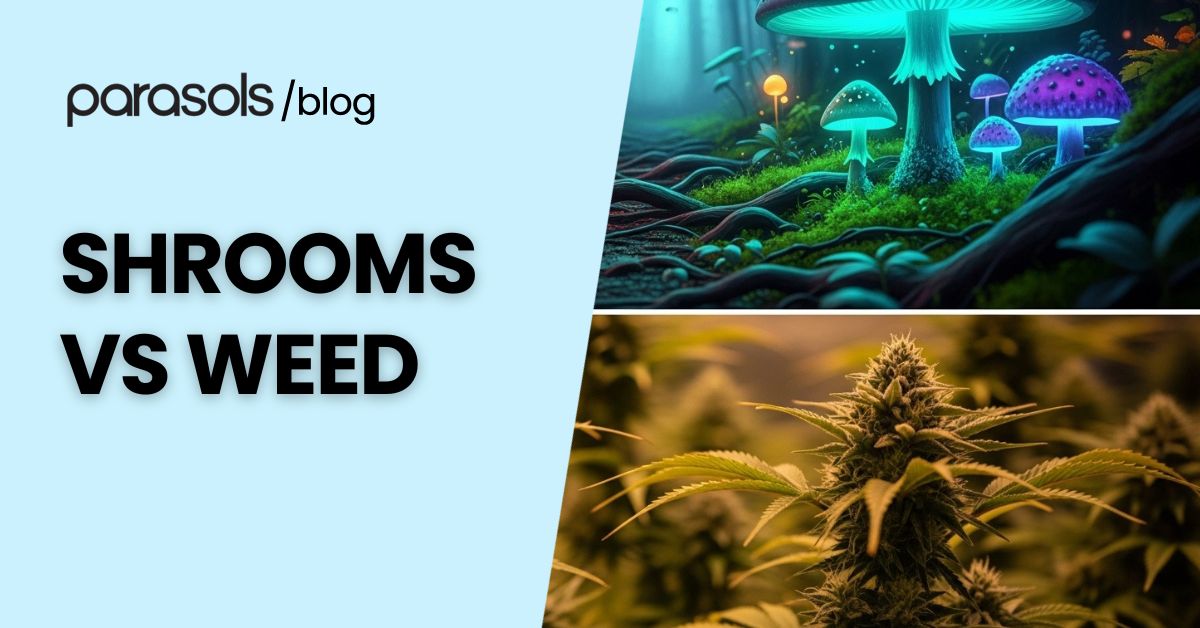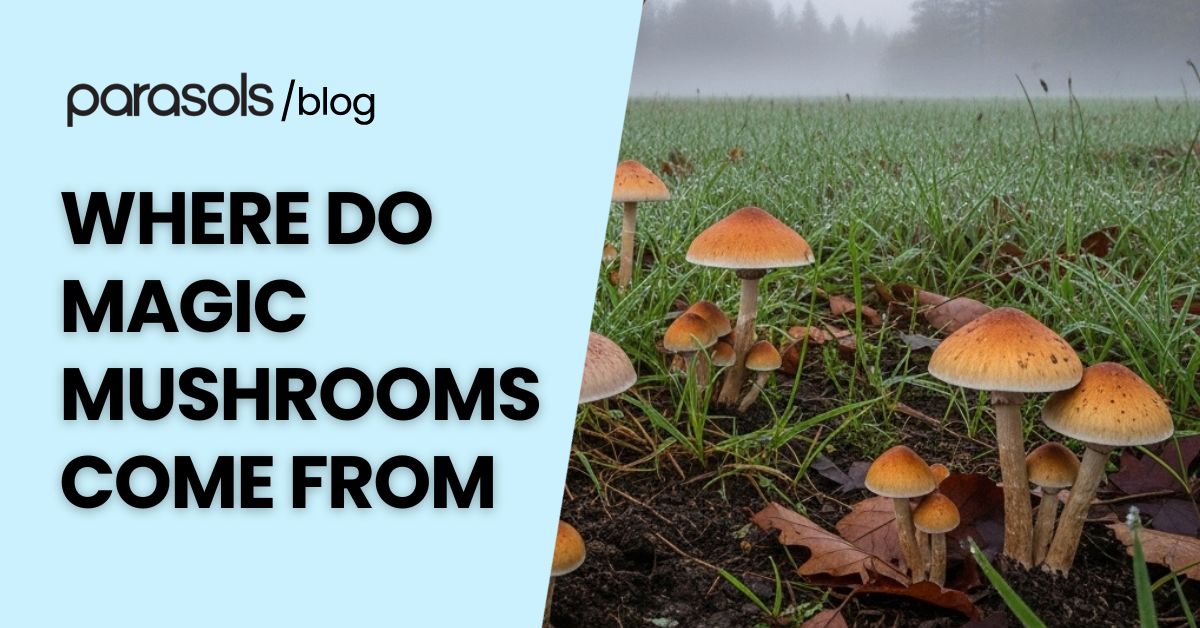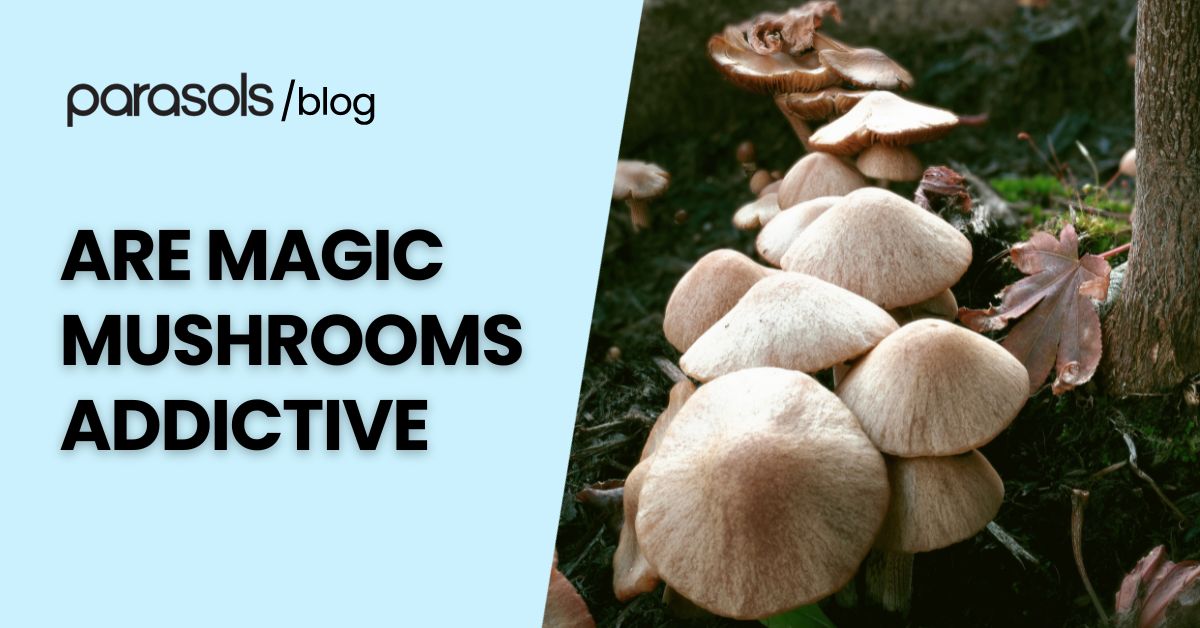Choosing between shrooms and weed isn’t just about curiosity — it’s about understanding how each one affects your mind, body, and overall well-being. Whether you’re studying them for relaxation, pain relief, or personal growth, knowing the key factors can help you make an informed and mindful choice.
Key Takeaways
- Shrooms contain psilocybin, while weed contains THC — both alter perception in different ways
- Shrooms affect serotonin receptors, while weed interacts with the body’s endocannabinoid system
- Weed typically promotes calm and euphoria; shrooms create vivid visuals and deep introspection
- Neither is physically addictive, but cannabis can cause psychological dependence with frequent use
- Both show therapeutic potential, but psilocybin is still largely restricted under the law
- Environment, dosage, and mindset greatly influence safety and overall experience
What are Shrooms?
Shrooms, or magic mushrooms, are a type of hallucinogenic mushroom that contains psilocybin — a natural compound known for its mind-altering and psychedelic effects. When consumed, psilocybin mushrooms can change perception, mood, and thought patterns, often leading to vivid sensory experiences and altered states of consciousness.
What is Weed?
Weed, also known as marijuana or cannabis, is a psychoactive substance that comes from the Cannabis plant. Its main active compound, THC, affects the brain by altering mood, perception, and sensory awareness, often creating feelings of relaxation, euphoria, or heightened sensory perception.
Shrooms Vs Weed

When it comes to shrooms vs weed, both can change how you think and feel — but they do so in very different ways. Understanding these differences can help you decide which substance aligns better with your goals, tolerance, and overall well-being.
Origin and Active Compounds
Shrooms, or psilocybin mushrooms, are natural fungi that contain psilocybin — a hallucinogenic compound responsible for their psychedelic effects. Weed, or cannabis, comes from the Cannabis plant and contains THC, the psychoactive substance that produces a “high.” While both can alter perception, magic mushrooms work differently by influencing serotonin receptors in the brain, whereas cannabis primarily affects the body’s endocannabinoid system.
Psychological Effects
Shrooms often lead to intense sensory perceptions, vivid hallucinations, and an altered sense of time and reality. These experiences, sometimes called a mushroom trip, can vary from deeply introspective to disorienting. Weed, on the other hand, tends to create a calmer or euphoric state, though higher doses or certain strains can also trigger intense anxiety or paranoia. Both substances affect mood and perception but to different degrees and with distinct emotional tones.
Physical Impact
Psilocybin mushrooms are generally considered safe in small doses, with minimal physical harm or addiction risk. However, they can temporarily increase blood pressure, cause dilated pupils, or nausea. Cannabis use may lead to increased heart rate and dry mouth, but it’s also known for potential pain relief and helping reduce nausea. In rare cases or with higher doses, both can cause discomfort or panic attacks.
Medical and Therapeutic Potential
Clinical trials suggest psilocybin mushrooms may support mental health treatment for conditions like depression or anxiety when used under medical supervision. Cannabis also shows therapeutic potential for pain relief, insomnia, and certain mental health conditions. However, combining mushrooms or weed with other medications should be approached cautiously to avoid potential risks.
Addiction and Dependence
Neither shrooms nor weed typically cause physical addiction, but both can lead to psychological dependence with frequent use. Marijuana use, especially when consumed daily, may cause withdrawal symptoms or cravings, while psychedelic mushrooms rarely do. Still, both substances can influence long-term mental health depending on factors like family history and personal sensitivity.
Recreational Use and Risks
Many people use both cannabis and psychedelic mushrooms recreationally to learn altered states or enhance well-being. However, combining shrooms and weed or consuming cannabis during a mushroom experience can intensify hallucinations, heighten anxiety, or increase the risk of a bad trip. Knowing your limits and using accurate information can help ensure a safer, more positive experience.
How to Choose Between Shrooms and Weed
Choosing between shrooms and weed depends on what you’re hoping to experience and how comfortable you are with altered perception. Each has its own effects, risks, and therapeutic potential — so understanding these factors can help you make a mindful, informed choice.
- Purpose of Use – Decide whether your goal is relaxation, pain relief, or deeper self-understanding. Weed is often preferred for stress relief and mild euphoria, while shrooms are chosen for introspection or spiritual experiences.
- Mental Health Conditions – If you have a history of anxiety, depression, or other mental health symptoms, approach both substances with caution. Psilocybin mushrooms can worsen mental health symptoms in rare cases, while cannabis may trigger intense anxiety or paranoia in sensitive users.
- Environment and Mindset – A calm, safe setting helps ensure a better experience. Shrooms can produce intense sensory perceptions and hallucinations, making environment control essential. Weed is generally more manageable but still affected by mood and surroundings.
- Physical and Psychological Effects – Weed tends to cause relaxation, increased appetite, and altered perception; shrooms can lead to vivid visuals, emotional shifts, and changes in thought patterns. Both affect the brain differently and may impact blood pressure or heart rate.
- Dosage and Tolerance – Higher doses of either can lead to overwhelming experiences or panic attacks. Start small, especially if it’s your first time. Combining shrooms and weed amplifies their effects and may increase potential risks.
- Addiction and Dependence – Shrooms are not physically addictive and rarely lead to withdrawal symptoms. Cannabis, however, can cause psychological dependence and mild withdrawal for frequent users.
- Medical Uses and Therapeutic Potential – Both substances are being studied for mental health treatment. Clinical trials suggest psilocybin may help with depression and anxiety, while cannabis is used for pain relief and reducing nausea. Consult a medical professional if you’re considering them for such conditions.
- Personal and Family History – If you or close relatives have a history of addiction or mental health issues, it’s best to be cautious. Both drugs interact with brain chemistry, and such factors can influence how your body and mind respond.
Final Thoughts

In the end, choosing between shrooms and weed comes down to your purpose, comfort level, and overall well-being. Both substances can influence perception and mood, but they do so in very different ways. Shrooms may offer deep introspection and a sense of connection, while weed often provides calm and relaxation. Whichever path you take, approach it with awareness, accurate information, and respect for your mental health.
If you’re curious to study the science behind these substances further, click here to learn more about how they affect the brain and well-being.
Frequently Asked Questions
Can you mix shrooms and weed safely?
Combining shrooms and weed can intensify their effects, leading to stronger hallucinations, altered perception, or even panic attacks. While some anecdotal reports describe enhanced relaxation, others mention bad trips or intense anxiety. It’s best to avoid mixing the two substances, especially without experience or supervision.
How long do the effects of shrooms last compared to weed?
A mushroom trip can last anywhere from 4 to 6 hours, depending on the dose and individual tolerance. Weed effects usually peak within 30 minutes to an hour and fade after 2 to 3 hours. The intensity and duration of both depend on dosage, strain, and personal metabolism.
Are there withdrawal symptoms when stopping either substance?
Psilocybin mushrooms generally don’t cause withdrawal symptoms since they’re not physically addictive. However, frequent cannabis use may lead to mild withdrawal effects such as irritability, sleep issues, or reduced appetite.
Can shrooms or weed worsen existing mental health conditions?
Yes. For individuals with a history of anxiety, depression, or psychosis, both substances can worsen mental health symptoms. Shrooms can trigger overwhelming experiences, while weed may cause paranoia or emotional distress in sensitive users.
Are there any legal or medical considerations to keep in mind?
Both substances are regulated differently worldwide. While cannabis is increasingly accessible in some areas for medical and recreational use, psilocybin remains illegal in most regions except in limited clinical trials or decriminalized zones. Always check local laws and consult a medical professional before using either for mental health treatment.



Leave a comment
All comments are moderated before being published.
This site is protected by hCaptcha and the hCaptcha Privacy Policy and Terms of Service apply.